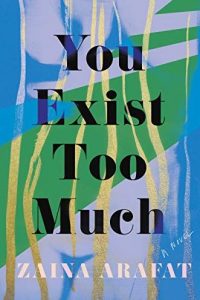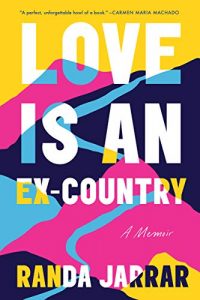Buy this from Bookshop.org to support local bookstores and the Lesbrary!
Earlier this month, during a trip to Portland, Oregon to cheer on the UConn Women’s Basketball team in the Sweet 16/Elite 8 (Go Huskies!), my partner and I visited the renowned Powell’s City of Books. We were perusing its gorgeous shelves when You Exist Too Much by Zaina Arafat (she/her) caught the eye of my partner, who has a knack for making book recommendations that are right in my wheelhouse. I had been looking for a queer book that highlights the female Arab American experience and the front cover of this book had a single blurb from Roxane Gay, which stated: “My favorite book of the year.” I was sold.
You Exist Too Much was published in 2020 and won the 2021 Lambda Literary Award for Bisexual Fiction. Arafat’s debut novel follows an unnamed, bisexual, Palestinian American protagonist from her adolescence through her adulthood as she navigates identity, sexuality, addiction, intimacy, and her fraught relationship with her domineering mother. While the story proceeds in a linear fashion, Arafat uses vignettes into the narrator’s past to contextualize her real-time thoughts, feelings, and experiences.
Initially, the narrator’s lack of a name made me feel frustrated. A name is important; it confers value and respect. Why would Arafat not name her protagonist when the stories and voices of queer women of color are already so stifled?
As I made my way through the novel, Arafat’s choice became clearer. The narrator is constantly fighting to create space for herself. Her mother often tells her, “You exist too much.” When the narrator broaches even a hypothetical discussion regarding her sexuality with her mother, her mother effectively disowns her, telling her, “Stay away from me and the rest of my family.” The narrator continues to struggle with space in all her romantic relationships, sometimes worrying about taking up too much space, other times feeling like she doesn’t even exist. The narrator’s lack of a name is, in part, a reflection of her disengagement from her mother and the expectation that she take up as little space as possible.
Arafat has a real aptitude for creating characters with depth. The unnamed protagonist is endearing, yet maddeningly messy, full of love, but also prone to disastrous decision-making. I did not always like her, but I did find myself rooting for her and admiring her resilience and her desire to cultivate healthy love. Her deep empathy for her incredibly flawed mother was achingly beautiful.
While I did not enjoy the book as much as I hoped I would, I do think it’s an interesting read from a talented writer that’s worth picking up. If you’d like to read more of Arafat’s writing, she is currently working on a collection of essays. You can also find her at @zainaara on Instagram.
Trigger warnings for sexual assault, domestic violence, racism, disordered eating, self-harm, homophobia, and biphobia.
Raquel R. Rivera (she/her/ella) is a Latina lawyer and lady lover from New Jersey. She is in a lifelong love affair with books and earned countless free personal pan pizzas from the Pizza Hut BOOK IT! program as a kid to prove it.
TAGS: ***, Raquel R. Rivera, You Exist Too Much, Zaina Arafat, Queer, Bisexual, Bisexual Main Character, Palestinian American, Arab American, Palestinian, Coming of Age, Addition, Homophobia, Biphobia


